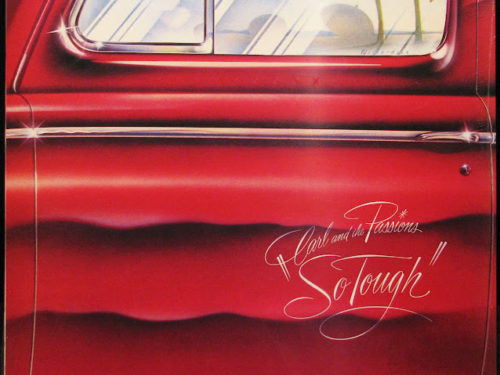Since June 2019, Craig Wright has tracked a standout song that he listened to every day. So each week (or so, give us a break) our editor will release a playlist of songs that have nothing to do with each other, make no sequential sense, and lack any overlying theme. Some are brand new discoveries, others are long-ingrained favorites; some will be completely unfamiliar, others completely inescapable. No matter what, each song is worth praising and one that ruled his day.
These songs were selected during the week of June 16-22, 2019.
“Academy Fight Song” — Mission of Burma Signals, Calls, and Marches (1981)
I’m not normally the type to put a single song on repeat for extended periods, but today I spun this for about an hour straight, losing count somewhere around the tenth play. Despite their chapter in Michael Azerrad’s DIY punk bible, Our Band Could Be Your Life, Mission of Burma is still an overlooked outfit. Formed in Boston in 1979, Roger Miller (guitar), Clint Conley (bass), and Peter Prescott (drums) pack so many elements into a song that you often have to disassemble each track piece-by-piece to comprehend their complexity. With added tape loops and effects from Martin Swope, Mission of Burma’s songs often pack a mild hypnotic factor in tandem with their signature brash guitars and philosophy-indebted lyrics.
“Academy Fight Song” is the group at its peak. The acoustic guitar in the background provides a tinny bounce a la Big Star that gives the song its camouflaged rotor. Prescott’s drums follow a backbeat with few cymbals as the floor tom hits carry the rhythm like a lopsided march step. Conley is one of my favorite bassists. His impact is unavoidable. So often bassists seem afraid to play more than one note at a time, as if striking more than one string would cause the signal to short circuit. Few employ power chords more effectively than Conley does. Right around the 1:55 mark in the song, Conley matches the guitar’s power chords, temporarily adding a fuller, rounder bottom to the song. With the added density, the guitar momentarily feels as if it’s floating. (Listen to “That’s When I Reach For My Revolver” to hear Conley’s power chord bass lines at their finest.)
Every element is perfectly placed, developed, and utilized. Much like the sound of marching feet, this song has a strange allure that is best experienced on repeat. Everything about this song is rock music approaching its most perfect form.
Purchase Signals, Calls, and Marches on Amazon
“Candy Says (Closet Mix)” — The Velvet Underground The Velvet Underground (1969)
In Ezra Furman’s wonderful 33 1/3 book about Lou Reed’s Transformer, she highlights this Reed quote from around the release of his first solo album in 1972: “I write through the eyes of somebody else. I’m always checking out people I know I’m going to write songs about. Then I become them. That’s why when I’m not doing that, I’m kind of empty. I don’t have a personality of my own. I just pick up other people’s personalities.” As strange as it is to hear one of the most influential musicians in the world saying he has nothing unique to offer, it’s equally hard not to wonder what mannerisms he might adapt if he were able to observe himself. Or, as Reed writes and Doug Yule sings in “Candy Says,” “What do you think I’d see / If I could walk away from me?” Possibly the gentlest song in the Velvet Underground’s catalog, it pairs perfectly with the Nico-sung “I’ll Be Your Mirror” as both wonder what it would be like to view yourself through the eyes of someone else, or as an out of body experience.
After the brash and beautiful White Light/White Heat (1968) that improves with every decibel, the stark pivot into the best-late-at-night-with-headphones-and-heartache third album only reinforces the band’s greatness. The spectrum of musical territory they successfully cover is phenomenal. So many bands pigeonhole themselves into a sound, but The Velvet Underground effectively traverse as broad a spectrum of sounds as any, and each album has devout followers who will fight to the death to say their particular favorite is the pinnacle of the band’s career. For my money, the Velvet’s peak lies somewhere within the first two albums.
All these years later countless musicians are still trying to emulate Reed. Clearly he must have had something to call his own.
Purchase The Velvet Underground on Amazon
“Okonkole Y Trompa” — Jaco Pastorius Jaco Pastorius (1976)
Jaco Pastorius is the type of brilliant that can’t be ignored. He can’t blend into the background because he and his Bass of Doom are incapable of being anything other than the center of attention. His hands fly (sometimes he does too), and he absorbs the spotlight by simply being near it. His fretless bass allows him to mimic lead guitars, trumpets, or just about any musical instrument he wants. His playing is so brilliant that it sometimes takes a while to comprehend how high of a level of difficulty he constantly plays at, and the sheer sense of ease at which he does makes it all the more impressive.
In “Okonkole Y Trompa,” Pastorius plays two looped bass parts. The first is the standout harmonic arpeggiated riff that induces the song’s trance-like atmosphere. The second is a reversed two-note phrase that feels like an incomplete gasp for breath. Everything about this song feels slightly off, which makes the puzzle pieces that much more satisfying when they seamlessly fall into place. The 5/4 time signature creates a slight hitch in the rhythmic pulse, but the percussion smooths out the feel for a smooth surface. The percussion and absolutely beautiful trumpet feel so soft around Jaco’s jagged bass line as the horn soars across the foreground. The song rests after four minutes but it could stay on a 10-hour loop and never feel dull.
Purchase Jaco Pastorius on Amazon
“Graveyard” — Dead Moon In The Graveyard (1988)
When I was younger, my family used to drive by Tombstone Music all the time, and we never realized what it was, or who it belonged to. It was Fred and Toody Cole’s hand-built mini village that housed a general store and guitar shop. Somehow I didn’t start listening to Dead Moon until after college and after Fred and drummer Andrew Loomis had both passed away. Since discovering them, they have made the fastest climb into my top-five favorite bands that I can recall.
“Graveyard,” the opening track on their first album, encapsulates a band within a single song about as well as any. The opening riff is a perfect stage setter — it’s sloppy, but utterly perfect. Few bands benefit more from lo-fi recordings because it makes their music sound like it simply can’t be contained. Fred’s voice is far from radio perfect, but it makes the graveyard come alive. Dead Moon was DIY to the max and to the end (Fred even built their guitars), and they never played by anyone’s rules except their own.
Tombstone Music used to be a store where Fred and Toody would sell guitars for below cost because they wanted local bands to have a chance. Now it’s a dispensary. If that’s not the tell-tale sign of Portland gentrification, I don’t know what is.
Purchase In the Graveyard on vinyl from Mississippi Records or digitally on Bandcamp
“Denver Haircut” The Hold Steady Thrashing Thru the Passion (2019)
After a series of casual Bandcamp singles, The Hold Steady announced Thrashing Thru The Passion, its first record with both Franz Nicolay and Steve Selvidge together. In “Denver Haircut,” the first of these new tracks, Craig Finn wastes no time establishing a character in the middle of a transformation who isn’t quite sure where he’s going; he just knows something has to change, starting with his shaving his head at the airport. And what better place to begin that journey than at an airport famous for its many conspiracies?
Finn’s solo records have grown stronger with each release, but critics and fans seem to have largely dismissed The Hold Steady’s two prior albums, Heaven Is Whenever (2010) and Teeth Dreams (2014). Those both contain some of the bands best songs in “The Weekenders,” “Oaks,” and “Spinners.” Finn quickly stacks details in “Denver Haircut” of a character who could have been in the background of past Hold Steady songs. Three standout lines in particular hold up to his high standard of lyrics:
“A shot in the dark in a bar that’s too bright / A window sucking up all the available light, right?”
“Wherever he goes he always orders the usual / He likes to see what they bring him.”
“It doesn’t have to be pure / It doesn’t have to be perfect / Just sort of has to be worth it.”
The details Finn jams into a single line are infuriatingly brilliant. The second line in particular conveys a more promising storyline and character quirk than most contemporary movies or TV series contain in their entirety. After Finn’s I Need a New War completed his incredible solo album trilogy, he’s carrying over his literary tilt with the full power of The Hold Steady in stride. Hallelujah, Charlemagne, and Gideon’s intertwining backstory that reaches through the band’s discography has always been the central focus for fans, but Thrashing Thru the Passion stands on its own as a new phase in the band’s history.
Purchase Thrashing Thru the Passion on Bandcamp or Amazon
“My Generation” — The Who Live At Leeds (1970)
I just finished Roger Daltrey’s autobiography, Thanks A Lot, Mr. Kibblewhite, and in addition to being a fun read about the more personal side of The Who, it’s also a gentle reminder that when the band was on stage together, they could implode at any moment. Or they could channel that turmoil into some of the finest live performances in history — which brings us to Live At Leeds. Arguably the greatest live album ever made, The Who cemented its legacy as a live act with this performance that displays the band’s power, versatility, and inimitable bond. No song makes that more clear than the “My Generation” medley that sneaks in a healthy batch of Tommy snippets, finds Pete Townsend playing one of the most iconic riff solos in history, and ultimately rides the line of destruction without Keith Moon having to blow up his drum set.
In contrast to Townsend’s Who I Am, Daltrey’s Thanks A Lot, Mr. Kibblewhite focuses less on the music and more on how Daltrey struggled to be a “zen duck” in a volatile band. But the main point he reiterates in every decade of the band’s existence is how much they respected each other amid the tension, fights, and tours. You can feel the respect and need for one another’s strengths to shine through in order for The Who to exist in this performance. Each member is firing at his peak level, guiding the others to greater heights. The whole album is astonishing, but this song is a reminder of the transformative power of the highest order of music.
Purchase Live at Leeds on Amazon
“Find It” — The Carrie Nations Beyond the Valley of the Dolls Original Soundtrack (Stu Phillips) (1970)
As easy as it is to find praise slung at this marvelous wonder of a movie, Beyond the Valley of the Dolls’ soundtrack goes oddly unappreciated. Composed by Stu Phillips, the songs bring an already lively movie into a screaming new reality. As the fictional Carrie Nations’ career takes an astronomical leap upon their arrival in Los Angeles, flamboyant impresario Z-Man (John LaZar) and the Hollywood elite embrace the band and their music, which guides the movie through its highest of highs and debilitating lows. From the first time the band appears onscreen the music takes a central role among the nonstop action. “Find It” is the standout number. The bass line propels the song with a krautrock pulse. The film is a campy and ridiculous version of a ’60s free love party scene, and that can’t be complete or convincing without an absolute killer band at its core.
The film is directed by Russ Meyer, the “King of the Nudies,” and written by Roger Ebert. Their pairing proved to be particularly effective. Beyond the Valley of the Dolls is my favorite movie to watch with a group because no other movie handles the absurdity, excess grandeur, and the sickening dark side of fame so well. The soundtrack sells the film. The film makes the soundtrack better.
Purchase the Beyond the Valley of the Dolls soundtrack on Amazon
Purchase Beyond the Valley of the Dolls on Blu-ray/DVD on Amazon
Stay up to date with all things Split Tooth Media and follow Craig on Twitter
(Split Tooth may earn a commission from purchases made through affiliate links on our site.)




